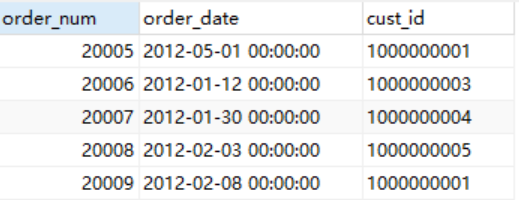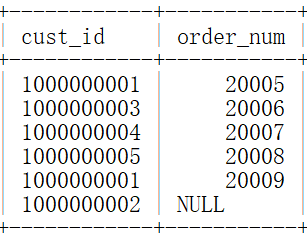MySQL基本语句与经典习题
【SQL语句大全】
本文用到的数据(5张表):
customers:

orders:

orderitems:

Products:

Vendors:

一、检索数据-select语句
select prod_name from products; #检索单个列
select prod_id,prod_name,prod_price from products; #检索多个列
select * from products;#检索所有列
select distinct vend_id from products; #选择不同的值,注意distinct作用于所有列而不仅是紧跟在其后的一列
select prod_name from products
limit 5;#返回5行
select prod_name from products
limit 5 offset 5; #返回从第5行起的5行数据:limit 开始 offset 行数
二、注释
行内注释:--注释
行内注释:#注释
多行注释:/*注释*/
三、排序检索数据
select prod_name from products
order by prod_name; #按单列排序
select prod_id,prod_price,prod_name from products
order by prod_price,prod_name; #按多个列排序,首先对price排,再对name排,注意仅在多行具有相同的price时才会对name进行排序
select prod_id,prod_price,prod_name from products
order by prod_price desc,prod_name; #对price降序,name升序,注意desc只应用到直接位于其前面的列名
四、过滤数据-where子句
select prod_name,prod_price from products
where prod_price<10; #检查单个值
where vend_id <>'DLL01'; #不匹配检查
where vend_id !='DLL01';
select prod_name,prod_price from products
where prod_price between 5 and 10; #范围性检查
select prod_name from products
where prod_price is null; #检查空值
select prod_id,prod_price,prod_name from products
where vend_id='DLL01' and prod_price<=4; #and操作符
where vend_id='DLL01' or vend_id='BRS01'; #or操作符
where vend_id in('DLL01','BRS01'); #in操作符,与or等价
where not vend_id='DLL01'; #not操作符,否定跟在其后的条件,等价于:where vend_id <>'DLL01'
where prod_name like 'Fish%'; #like操作符+%通配符,返回所有以Fish起头的产品
where prod_name like'%bean bag%'; #检索包含文本bean bag的值,不管在之前还是之后。
where prod_name like'F%y'; #检索以F起头,以y结尾的所有产品
五、汇总数据
select avg(prod_price) as avg_price #avg()用于求均值,只用于单列,忽略列值为null的行
from products;
select count(*) as num_cust from customers; #计算表中行的数目,不忽略空值
select count(cust_email) as num_cust #计算指定列中具有值的行数,掠过空值
from customers;
select max(prod_price) as max_price #返回最大价格,忽略空值
from products;
select min(prod_price) as min_price #返回最低价格,忽略空值
from products;
select sum(quantity) as items_ordered #求和,忽略空值
from orderitems;
六、分组数据
select vend_id,count(*) as num_prods
from products
group by vend_id; #按id进行分组,count对每个id都做一次计数,group by子句必须出现在where子句之后,order by之前
group by cust_id
having count(*)>=2;#过滤分组
七、子查询
select cust_id from orders
where order_num in(select order_num from orderitems
where prod_id='RGAN01'); #由内向外执行
等价于:
select order_num from orderitems
where prod_id='RGAN01';
输出:
order_num
-------------
20007
20008
select cust_id from orders
where order_num in(20007,20008);
八、联结表
#内连接(等值连接)
select vend_name,prod_name,prod_price
from vendors inner join products
on vendors.vend_id=products.vend_id; #连接条件为vendors.vend_id=products.vend_id
等价于:
select vend_name,prod_name,prod_price
from vendors,products
where vendors.vend_id=products.vend_id;
#多表连接
select prod_name,vend_name,prod_price,quantity
from oederitems,products,vendors
where products.vend_id=vendors.vend_id
and orderitems.prod_id=products.prod_id
and order_num=20007;
#自连接
select c1.cust_id,c1.cust_name,c1.cust_contact
from customers as c1,customers as c2 #使用表别名
where c1.cust_name=c2.cust_name
and c2.cust_contact='jim jones';
等价于:
select cust_id,cust_name,cust_contact
from customers
where cust_name=(select cust_name
from customers
where cust_contact='jim jones');
#外连接
select customers.cust_id,orders.order_num
from customers left outer join orders
on customers.cust_id=orders.cust_id; #左外连接,left指定from子句左边的表(customers)选择所有行
输出:

select customers.cust_id,orders.order_num
from customers right outer join orders
on customers.cust_id=orders.cust_id; #右外连接,right指定from子句右边的表(orders)选择所有行
输出:

九、组合查询
#union:组合多个查询的结果到一个输出集,所以要求union中每个查询必须包含相同的列,表达式或聚合函数
select cust_name,cust_contact,cust_email
from customers
where cust_state in('il','in','mi');#查询一
输出:

select cust_name,cust_contact,cust_email
from customers
where cust_name='fun4all';#查询二
输出:

select cust_name,cust_contact,cust_email
from customers
where cust_state in('il','in','mi')
union
select cust_name,cust_contact,cust_email
from customers
where cust_name='fun4all'; #组合查询,默认去除重复行,使用union all则返回所有匹配行
输出:

十、更新和删除数据
#update
update customers #指定要更新的表
set cust_email='kim@thetoystore.com' #指定列名和其新值
where cust_id='1000000005'; #确定要更新哪些行的过滤条件
update customers
set cust_contact='sam roberts',
cust_email='sam@toyland.com'
where cust_id='1000000006'; #更新多个列时,中间用,隔开
update customers
set cust_email=null
where cust_id='1000000005'; #相当于删除作用
#delete
delete from customers
where cust_id='1000000006';
【SQL经典练习】
/*--------------创建并使用数据库------------*/
mysql> create database 50q;
mysql> use 50q;
/*-------------------建表-------------------------*/
mysql> CREATE TABLE STUDENT
(
SNO VARCHAR(3) NOT NULL,
SNAME VARCHAR(4) NOT NULL,
SSEX VARCHAR(2) NOT NULL,
SBIRTHDAY DATETIME,
CLASS VARCHAR(5)
);
mysql> CREATE TABLE COURSE
(
CNO VARCHAR(5) NOT NULL,
CNAME VARCHAR(10) NOT NULL,
TNO VARCHAR(3) NOT NULL
);
mysql> CREATE TABLE SCORE
(
SNO VARCHAR(3) NOT NULL,
CNO VARCHAR(5) NOT NULL,
DEGREE NUMERIC(10, 1) NOT NULL
) ;
mysql> CREATE TABLE TEACHER
(
TNO VARCHAR(3) NOT NULL,
TNAME VARCHAR(4) NOT NULL,
TSEX VARCHAR(2) NOT NULL,
TBIRTHDAY DATETIME NOT NULL,
PROF VARCHAR(6),
DEPART VARCHAR(10) NOT NULL
);
/*---------------添加主键--------------*/
mysql> ALTER TABLE STUDENT ADD PRIMARY KEY (SNO);
ALTER TABLE SCORE ADD PRIMARY KEY (SNO,CNO);
ALTER TABLE COURSE ADD PRIMARY KEY (CNO);
ALTER TABLE TEACHER ADD PRIMARY KEY (TNO);
#--------主键在两张table中的数据类型须一致-------*/
mysql> ALTER TABLE SCORE ADD CONSTRAINT FK_SCORE_STUDENT FOREIGN KEY (SNO) REFERENCES STUDENT(SNO);
ALTER TABLE SCORE ADD CONSTRAINT FK_SCORE_COURSE FOREIGN KEY (CNO) REFERENCES COURSE(CNO);
ALTER TABLE COURSE ADD CONSTRAINT FK_COURSE_TEACHER FOREIGN KEY (TNO) REFERENCES TEACHER(TNO);
/*---------------输入记录-------------------*/
mysql-> INSERT INTO STUDENT (SNO,SNAME,SSEX,SBIRTHDAY,CLASS)
VALUES (108 ,'曾华' ,'男' ,'1977-09-01',95033),
(105 ,'匡明' ,'男' ,'1975-10-02',95031),
(107 ,'王丽' ,'女' ,'1976-01-23',95033),
(101 ,'李军' ,'男' ,'1976-02-20',95033),
(109 ,'王芳' ,'女' ,'1975-02-10',95031),
(103 ,'陆君' ,'男' ,'1974-06-03',95031);
mysql> INSERT INTO TEACHER(TNO,TNAME,TSEX,TBIRTHDAY,PROF,DEPART)
VALUES (804,'李诚','男','1958-12-02','副教授','计算机系'),
(856,'张旭','男','1969-03-12','讲师','电子工程系'),
(825,'王萍','女','1972-05-05','助教','计算机系'),
(831,'刘冰','女','1977-08-14','助教','电子工程系');
mysql> INSERT INTO COURSE(CNO,CNAME,TNO)
VALUES ('3-105' ,'计算机导论',825),
('3-245' ,'操作系统' ,804),
('6-166' ,'数据电路' ,856),
('9-888' ,'高等数学' ,831);
mysql> INSERT INTO SCORE(SNO,CNO,DEGREE)
VALUES (103,'3-245',86),(105,'3-245',75),
(109,'3-245',68),(103,'3-105',92),
(105,'3-105',88),(109,'3-105',76),
(101,'3-105',64),(107,'3-105',91),
(108,'3-105',78),(101,'6-166',85),
(107,'6-166',79),(108,'6-166',81);
#1.查询student表中的所有记录的sname,ssex,class列
-> select sname,ssex,class from student;
#2.查询教师所有的单位即不重复的Depart列
-> select distinct depart from teacher;
#3.查询Student表的所有记录
-> select*from student;
#4.查询Score表中成绩在60到80之间的所有记录
1)
-> select * from score
-> where degree>=60 and degree<=80;
2)
-> select * from score
-> where degree between 60 and 80;
#5.查询Score表中成绩为85,86或88的记录
#1)
-> select * from score
-> where degree=85 or degree=86 or degree=88;
#2)
-> select * from score
-> where degree in(85,86,88);
#6.查询Student表中“95031”班或性别为“女”的同学记录
-> select * from student
-> where class="95031" or ssex='女';
#7.以Class降序查询Student表的所有记录
-> select * from student
-> order by class desc;
#8.以Cno升序、Degree降序查询Score表的所有记录
-> select * from score
-> order by cno,degree desc;
#9.查询“95031”班的学生人数
-> select count(*) from student
-> where class="95031";
#10.查询Score表中的最高分的学生学号和课程号
#1)
-> select sno,cno from score
-> where degree=(select max(degree) from score);
#2)
-> select sno, cno from score
-> order by degree desc
-> limit 1;
#11.查询‘3-105’号课程的平均分
-> select avg(degree) from score
-> where cno='3-105';
#12.查询Score表中至少有5名学生选修的并以3开头的课程的平均分数
-> select avg(degree) from score
-> where cno like'3%'
-> group by cno
-> having count(*)>=5;
#13.查询最低分大于70,最高分小于90的Sno列
mysql> select sno from score
-> group by sno
-> having max(degree)<90 and min(degree)>70;
#14.查询所有学生的Sname、Cno和Degree列
#1)
-> select sname,cno,degree
-> from student,score
-> where student.sno=score.sno;
#2)
-> select sname,cno,degree
-> from student inner join score
-> on student.sno=score.sno;
#15.查询所有学生的Sname、Cname和Degree列
-> select sname,cname,degree
-> from student,course,score
-> where student.sno=score.sno
-> and course.cno=score.cno;
#16.查询“95033”班所选课程的平均分
-> select avg(degree)
-> from score,student
-> where score.sno=student.sno
-> and class="95033";
#17.查询选修“3-105”课程的成绩高于“109”号同学成绩的所有同学的记录
-> select * from score
-> where cno='3-105' and degree>(select degree from score
-> where cno='3-105' and sno=109);
#19、查询score中选学一门以上课程的同学中分数为非最高分成绩的记录
-> select*from score
-> where degree<(select max(degree) from score)
-> and sno in(select sno from score
-> group by sno
-> having count(*)>1);
#20.查询成绩高于学号为“109”、课程号为“3-105”的成绩的所有记录
-> select*from score
-> where degree>(select degree from score
-> where sno='109'
-> and cno='3-105');
#21、查询和学号为108的同学同年出生的所有学生的Sno、Sname和Sbirthday列
-> select sno,sname,sbirthday
-> from student
-> where year(sbirthday)=(select year(sbirthday) from student
-> where sno=108);
#22、查询“张旭“教师任课的学生成绩
-> select degree
-> from score,teacher,course
-> where score.cno=course.cno
-> and course.tno=teacher.tno
-> and teacher.tname='张旭';
#23、查询选修某课程的同学人数多于5人的教师姓名
-> select tname
-> from teacher,course,score
-> where teacher.tno=course.tno
-> and course.cno=score.cno
-> group by score.cno
-> having count(*)>5;
# 24、查询95033班和95031班全体学生的记录
-> select*from student
-> where class in(95033,95031);
#25、查询出“计算机系“教师所教课程的成绩表
-> select degree from score,teacher,course
-> where score.cno=course.cno
-> and course.tno=teacher.tno
-> and teacher.depart='计算机系';
#26.查询“计算机系”与“电子工程系“不同职称的教师的Tname和Prof
-> select tname,prof from teacher
-> where depart='计算机系'
-> and prof not in(select prof from teacher
-> where depart='电子工程系');
#27、查询选修编号为“3-105“课程且成绩至少高于选修编号为“3-245”的同学的Cno、Sno和Degree,并按Degree从高到低次序排序。
mysql> select*from score
-> where degree>any(select degree from score where cno='3-245')
-> and cno='3-105'
-> order by degree desc;
#28、查询选修编号为“3-105”且成绩高于选修编号为“3-245”课程的同学的Cno、Sno和Degree.
-> select*from score
-> where degree>all(select degree from score where cno='3-245')
-> and cno='3-105';
#29、查询所有教师和同学的name、sex和birthday
-> select sname as name,ssex as sex,sbirthday as birthday
-> from student
-> union
-> select tname as name,tsex as sex,tbirthday as birthday
-> from teacher;
#30、查询所有“女”教师和“女”同学的name、sex和birthday
-> select sname as name,ssex as sex,sbirthday as birthday
-> from student
-> where ssex='女'
-> union
-> select tname as name,tsex as sex,tbirthday as birthday
-> from teacher
-> where tsex='女';
#32、查询成绩比该课程平均成绩低的同学的成绩表
-> select A.* from score as A
-> where degree<(select avg(degree) from score as B
-> where A.cno=B.cno);
#33、查询所有任课教师的Tname和Depart
#1)
-> select tname,depart
-> from teacher,course
-> where teacher.tno=course.tno;
#2)
-> select tname,depart from teacher
-> where tno in (select tno from course);
#3)
-> select A.tname,A.depart
-> from teacher A inner join course B
-> on A.tno=B.tno;
#4)
-> select tname,depart from teacher as A
-> where exists(select*from course as B
-> where A.tno=B.tno);#存在则输出
#34.查询所有未讲课的教师的Tname和Depart
-> select tname,depart from teacher
-> where tno not in(select tno from course);
#35.查询至少有2名男生的班号
#1)
-> select class from student
-> group by class,ssex
-> having count(*)>=2;
#2)
-> select class from student
-> where ssex='男'
-> group by class;
#36、查询Student表中不姓“王”的同学记录
-> select*from student
-> where sname not like '王%';
-> select sname,year(now())-year(sbirthday) as age
-> from student;#38、查询Student表中每个学生的姓名和年龄
#37、查询“男”教师及其所上的课程
-> select teacher.tno,tname,cno
-> from teacher inner join course
-> on teacher.tno=course.tno
-> where tsex='男';
#38、查询和“李军”同性别并同班的同学Sname
-> select A.sname
-> from student as A,student as B
-> where A.ssex=B.ssex
-> and A.class=B.class
-> and B.sname='李军';
MySQL基本语句与经典习题的更多相关文章
- MySQL 常用语句 (汇集)
原文地址:MySql常用语句作者:wuyanle 一.mysql常用语句 创建,删除和最基本查询: 显示数据库 mysql->show databases; 创建数据库 mysql-> ...
- mysql sql语句大全(转载)
1.说明:创建数据库 CREATE DATABASE database-name 2.说明:删除数据库 drop database dbname 3.说明:备份sql server --- 创建 ...
- MySQL的语句执行顺序
MySQL的语句执行顺序 MySQL的语句一共分为11步,如下图所标注的那样,最先执行的总是FROM操作,最后执行的是LIMIT操作.其中每一个操作都会产生一张虚拟的表,这个虚拟的表作为一个处理的输入 ...
- strace追踪mysql执行语句
一.strace参数 strace是Linux环境下的一款程序调试工具,用来监察一个应用程序所使用的系统调用及它所接收的系统信息.追踪程序运行时的整个生命周期,输出每一个系统调用的名字,参数,返回值和 ...
- MySQL 基础语句
MySQL 基础语句 多个知识点 ----------------------------------------------------------------------------------- ...
- MySQL DELETE语句和TRUNCATE TABLE语句的区别
MySQL DELETE语句和TRUNCATE TABLE语句的区别 2010-10-08 16:05 佚名 互联网 字号:T | T 在MySQL数据库中,DELETE语句和TRUNCATE TAB ...
- 使用 xlrd 模块实现对excel 的读取、excel转json 、excel 转 mysql insert 语句
#-*- coding:utf-8 -*- # 处理 excel 中的 area 为 Mysql insert 语句 import xlrd, json, codecs, os # data = xl ...
- MySQL update语句和insert插入语句写法完全不一样啊,不要搞混
1.mysql update 语句: update user set name = 'xiaoming',age = 18 where uid = 3000; 更新记录时update操作也不需要写ta ...
- T-SQL:SQL Server-SQL语句大全经典
ylbtech-SQL Server-Doc-Help:SQL Server-SQL语句大全经典 SQL Server 流程控制中的 While 语句. 1,SQL语句大全经典返回顶部 .说明:创建数 ...
随机推荐
- 安装coreseek cannot find input file: src/Makefile.in 错误解决方法
安装coreseek 出现了cannot find input file: src/Makefile.in 解决方法如下 >autoheader >automake --add-missi ...
- 修改windows7中文件的权限
1.修改ntkrnlpa.exe的权限 2.鼠标右键,选择"属性" 3.单击"安全"选项,选择"高级" 4.在高级安全设置中,选择" ...
- Servlet配置
1.在Servlet中,Servlet的配置 @WebServlet(name="csvExportServlet",urlPatterns="/servlet/CsvE ...
- 用SPSS 画 人口金字塔(限SPSS 13.0以上)
现在网络上人口金字塔较多的是用excel来实现(可参考链接),但是用spss的步骤又很不明确,于是乎,想着自己试试. 在 SPSS 软件中,绘制人口金字塔是 SPSS13.0 新增的一种图形, 因此只 ...
- WebService之CXF注解报错(二)
WebService之CXF注解 1.具体报错如下 五月 04, 2014 11:24:12 下午 org.apache.cxf.wsdl.service.factory.ReflectionServ ...
- EJB相关的面试题
1.EJB是基于哪些技术实现的?并说出SessionBean和EntityBean的区别,StatefulBean和StatelessBean的区别. (1)EJB包括Session Bean.Ent ...
- javaWeb之自动发送邮件生日祝福(ServletContextListener监听)
在看完本随笔仍然不理解的可以看 javaWeb邮箱发送 :里面有具体的邮箱服务器配置 企业在员工生日当天发送邮箱生日祝福: 一般是用监听器完成: 而合适的监听是ServletContextLis ...
- 芝麻HTTP:在阿里云上测试Gerapy教程
1.配置环境 阿里云的版本是2.7.5,所以用pyenv新安装了一个3.6.4的环境,安装后使用pyenv global 3.6.4即可使用3.6.4的环境,我个人比较喜欢这样,切换自如,互不影响. ...
- 从零一起学Spring Boot之LayIM项目长成记(六)单聊群聊的实现
文章传送门: https://my.oschina.net/panzi1/blog/1577007 并没有放弃博客园,只是 t-io 在 oschina发展.用了人家的框架,也得帮人家做做宣传是吧~~
- php 数组排序得方法
$sort1 = array_column($list_bloc[1], 'value');//按照$list_bloc[1]里面的value做降序排序 array_multisort($sort1, ...
